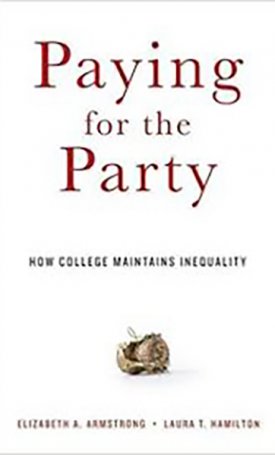Paying for the Party: How College Maintains Inequality
-10%
6 740 Ft
6 066 Ft
Előrendelés(Bejelentkezés szükséges)
A kedvezményes árak kizárólag a webshopunkon keresztül leadott megrendelésekre érvényesek!
Paying for the Party: How College Maintains Inequality
Drawing on findings from a five-year interview study, Elizabeth Armstrong and Laura Hamilton bring us to the campus of “MU,” a flagship Midwestern public university, where we follow a group of women drawn into a culture of status seeking and sororities. Mapping different pathways available to MU students, the authors demonstrate that the most well-resourced and seductive route is a “party pathway” anchored in the Greek system and facilitated by the administration. This pathway exerts influence over the academic and social experiences of all students, and while it benefits the affluent and well-connected, Armstrong and Hamilton make clear how it seriously disadvantages the majority.
Eye-opening and provocative, Paying for the Party reveals how outcomes can differ so dramatically for those whom universities enroll.
List of Figures and Tables*
Preface
Introduction
1. The Women
2. The Party Pathway
3. Rush and the Party Scene
4. The Floor
5. Socialites, Wannabes, and Fit with the Party Pathway
6. Strivers, Creaming, and the Blocked Mobility Pathway
7. Achievers, Underachievers, and the Professional Pathway
8. College Pathways and Post-College Prospects
9. Politics and Pathways
Appendix A: Participants
Appendix B: Studying Social Class
Appendix C: Data Collection, Analysis, and Writing
Appendix D: Ethical Considerations
Notes
References
Acknowledgments
Index
* Figures and Tables:
Figures
I.1 Accounting for college experiences and class trajectories
4.1 Layout of the floor
Tables
I.1 Class projects, college pathways, organizational imperatives, and the flow of students through the university
1.1 MU undergraduates, 2004–2005, versus floor residents
1.2 Class background of study participants
1.3 Class-based resources
2.1 The social calendar
5.1 Socialite and wannabe college experiences
5.2 Socialite and wannabe post-college trajectories
6.1 Striver college experiences
6.2 Striver trajectories: stayers versus leavers
7.1 Achiever and underachiever college experiences
7.2 Achiever and underachiever trajectories
8.1 Trajectories at college exit of privileged women
8.2 Trajectories at college exit of less privileged women
A.1 Study participants
A.2 Interviews collected by year
Authors:
Elizabeth A. Armstrong is Professor of Sociology and Organizational Studies at the University of Michigan.
Laura T. Hamilton is Associate Professor of Sociology at the University of California, Merced.
















